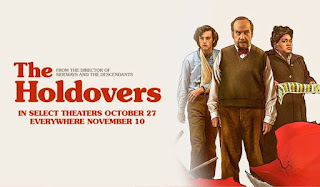by A.J.
Best Pictures #96: 2023 (96th) Academy Awards Best Picture Nominee
There are plenty of movies that deal with how the holidays can make people feel miserable. The Holdovers, director Alexander Payne’s latest movie, set over the Christmas break of 1970-71 at a prestigious New England boarding school, is different from those because it is about people who would rather not be miserable. Ancient civilizations teacher Paul Hunham (Paul Giamatti) would rather spend his break reading mystery novels. Rebellious student Angus Tully (Dominic Sessa) would rather be in St. Kitts. Mary Lamb (Da’Vine Joy Randolph), the school’s kitchen manager, would rather be with her son, who was recently killed in Vietnam. They end up more or less stuck together at the empty school and as the dreary days pass they slowly but surely open up and find unlikely comfort and joy. It’s a story we’ve seen before but rarely done so well. Payne’s previous collaboration with Giamatti resulted in Sideways (2003), probably Payne’s best film and one of Giamatti’s best performances. The results here are thankfully similar.
David Hemingson’s original screenplay was written especially for Giamatti, who once again works wonders with a prickly character. As much as Paul resembles Giamatti’s character from Sideways (both are well educated misanthropes who end up on a road trip), he has much more in common with another notable Giamatti performance: John Adams. Both Paul and John Adams are well educated New England intellectuals who attended Harvard, are privileged but are conscious of the conditions the less privileged, are disdainful of the rich and undeserving elites they have to work with, are both hurt by and enjoy their isolation from their peers, and are aware that they are, to quote Adams, “obnoxious and disliked.” John Adams is an irritable personality but Giamatti makes him understandable and likable; he does the same for Paul.
As punishment for failing the son of a rich politician, Paul is assigned to look after the students that are not able to go home for Christmas break: the holdovers. An amusing and welcome plot contrivance whisks the other boys away to a vacation with the father of one of the richer holdovers leaving only Angus behind, much to the equal dismay of Angus and Paul. Angus is played wonderfully by Dominic Sessa in his impressive screen debut. He is troubled and rebellious but far from a bad student or person. The revelation of Angus’s family troubles and how he deals with them feels free of dramatic contrivance.
Da’Vine Joy Randolph has rightfully earned much praise and a Best Supporting Actress Oscar nomination for her performance. We learn early on that her son attended the boarding school on a scholarship but because she could not afford to send him to college he was drafted and died in Vietnam. Randolph’s Mary is not a sad-sack or a worn down character. On the contrary, she comes across as the most put together of the trio, but melancholy looms over her and finally spills over at a Christmas Eve party in a subdued but emotional, and therefore instantly believable, scene.
Alexander Payne went out of his way to make The Holdovers look like it was made during the era in which it is set. As a fan of films of that period I must say he succeeded. Though the late 1960’s and early 1970’s are remembered as a time of vibrant colors, the films from that period look drab and devoid of color and The Holdovers captures that look. It opens with a period accurate Universal Studios logo, a trend and pet peeve of mine, but it delivers on that promise. The score genuinely sounds like an original score from an early 70’s movie, vaguely folkish and wistful. There is plenty of period music but none of the “needle drops” are obvious or feel like a compilation of the best-of-the-1970’s. The most notable music sequence is an extended ice skating scene from Paul and Angus’s “field trip” to Boston set to Cat Stevens’s poignant and magical "The Wind." Like many films of that New Hollywood era, the screenplay is very light on plot and is more or less an assemblage of scenes that show an understated journey of personal growth. The side effect of this is that there are a few scenes that are entertaining but ultimately superfluous. The Holdovers brought to mind the films of Hal Ashby, director of Harold and Maude (1971) and The Last Detail (1973), which was likely the intent of director Payne, and this is a good thing. However, Ashby, who began his career as an editor, would likely have made a slimmer but equally affecting film. The Holdovers is streaming on Peacock Premium and available on DVD/Blu-Ray.





No comments:
Post a Comment